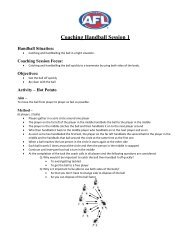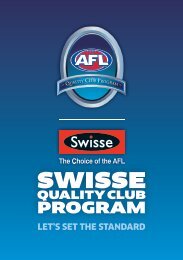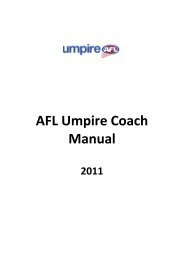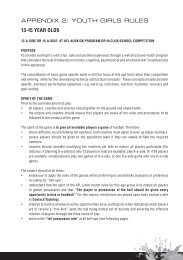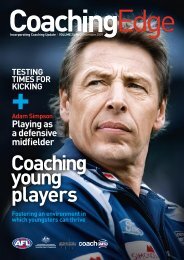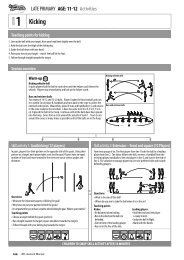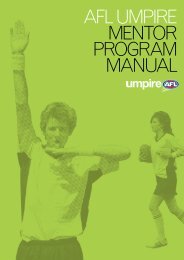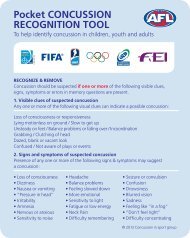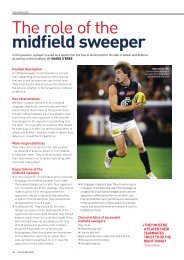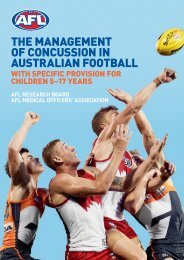2012 Youth Coaching Manual - AFL Community
2012 Youth Coaching Manual - AFL Community
2012 Youth Coaching Manual - AFL Community
You also want an ePaper? Increase the reach of your titles
YUMPU automatically turns print PDFs into web optimized ePapers that Google loves.
Personal factors<br />
(Andrew Fuller)<br />
• Having a pleasant temperament and reasonably calm level of activity.<br />
• Reacting to social cues and responding to people’s interaction.<br />
• Having an age – appropriate level of autonomy.<br />
• Having curiosity and zest for life.<br />
• High intelligence (except) when paired with sensitive temperament.<br />
• Success during adolescence.<br />
• Having a special gift, ability or talent.<br />
Family<br />
• Having a sense of belonging or connectedness to family.<br />
• Having some traits or characteristics valued by family members.<br />
• Having a warm relationship with even one parent can protect young people even in situations where there is quite<br />
pronounced parental violence and disharmony.<br />
Peer and Adult support<br />
• Having a sense of belonging and connectedness to school. This doesn’t always correspond with academic performance.<br />
• Positive achievements and evaluations in a school setting, having someone who believes in you.<br />
• Having a positive relationship with an adult outside the family.<br />
Communities provide the setting for healthy growth<br />
• Participation in sporting (e.g. football), recreational or other community groups is protective.<br />
• A sense that adults in the local neighbourhood take an interest in the welfare and behaviour of young people is protective.<br />
• Bored kids with nowhere to go are more likely to find risky lifestyles interesting.<br />
• There is a need to create opportunities for communities engage more with young people.<br />
• Participation in our local communities and with the young people in them has diminished for too many of us with busy<br />
work schedules and other agendas.<br />
What is the research telling us?<br />
Research tells us that youth who are involved and feel safe, valued and connected are less likely to participate in risky<br />
behaviours and that social competitiveness learnt through active involvement make relationships in all areas easier to<br />
negotiate.<br />
Life skills build resiliency<br />
• Communication skills.<br />
• Decision-making and problem-solving skills.<br />
• Coping skills (i.e.: reframing).<br />
• Conflict resolution and stress management (options).<br />
• Assertiveness.<br />
• Leadership skills.<br />
• Generic employability skills.<br />
• Interpersonal relationship skills.<br />
• Resisting peer pressure.<br />
• Seeking adult support.<br />
Most of these skills can be developed or enhanced in a football environment which delivers effective coaching.<br />
168 <strong>AFL</strong> <strong>Youth</strong> <strong>Coaching</strong> <strong>Manual</strong>



